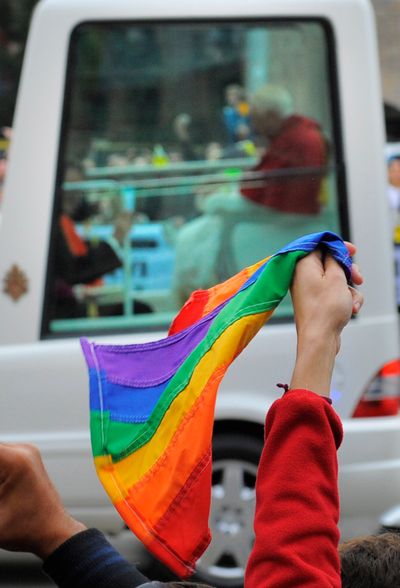Spokane’s Catholic community reacts to Pope’s approval of same-sex blessings

Pope Francis’ declaration this week allowing priests to bless same-sex couples is being hailed in Spokane as a shift by advocates of softening the church’s doctrine on the issue while more conservative faith leaders are quick to point out the gulf between blessings and more formal and unchanged rules regarding ceremonies such as marriage.
The papal declaration “Fiducia Supplicans” grabbed headlines and was championed by progressive voices, but the text of the declaration is careful not to condone same-sex relationships.
Bishop Thomas Daly, the leader of Spokane’s Catholic diocese, declined an interview but issued a statement Wednesday emphasizing the church’s unchanging doctrine.
“The blessing established in Fiducia Supplicans does not legitimatize any same-sex unions,” Daly said.
“Such blessings do not approve of any immoral actions or relationships and are given at the discretion of the priest.”
Daly has taken a conservative stance on LGBTQ+ issues in the past. In 2020, he criticized an LGBTQ+ rights clinic that opened at Gonzaga Law School, saying it could conflict with religious freedom and promote values contrary to the Catholic faith.
Even so, for some local gay Catholics, the news was welcomed.
“It’s a Christmas present from the Pope,” said Mark Carlos, who is bisexual and attends Our Lady of Lourdes Cathedral in Spokane. Carlos, 35, was raised in the faith in Texas and California, and serves as a lay minister.
He said the church is balancing faith and tradition as it modernizes.
Joe Parry, 25, who is gay and a self-described “cradle Catholic” born and raised in the faith, was heartened by the news.
“It is exciting to see progress toward inclusion,” he said.
Both Carlos and Parry maintain their faith while praying for more progress.
It was hard for Carlos growing up as a Catholic and a queer person. People sometimes ask why he doesn’t go to a more LGBTQ-friendly church. For him, the Catholic church is home, and he values the tradition and lineage dating back 2,000 years.
He would like to eventually receive a blessing if he gets married.
The declaration from the Vatican reaffirms the church’s doctrine that marriage is only between a man and a woman. Sexual relations outside of marriage are considered sin.
The blessings are meant to invoke God’s help and love. “There is no intention to legitimize anything, but rather to open one’s life to God,” the declaration says.
“These couples can request a blessing from a priest, recognizing they are inviting God into their lives and their relationship and doing the best that they can,” said Joseph Mudd, director of Catholic Studies at Gonzaga University. “But it is not to be understood as a marriage.”
These informal or spontaneous blessings for same-sex couples and “couples in irregular situations” should be distinguished from the church’s ritual sacraments, according to the declaration. These blessings should not take any prescribed form.
To avoid confusion, the blessings should not be given along with any event or ritual in connection to or resembling a wedding or civil ceremony, according to the declaration. Instead, these blessings could be given at a separate meeting with a priest or at a visit to a shrine.
Parry said he would love to see the church accept and value same-sex marriage in the way it does for straight couples. At the same time, he understands the theology is rooted in long history and deep faith, so progress is slow.
“The church is moving in the right direction,” he said.
Like Carlos, Parry has had a long journey reconciling his two identities.
“I knew I was Catholic before I knew I was gay,” Parry said.
It was a conflict that took a lot of reflection and some time away from the church for him to become comfortable with.
“I do think you can be gay and Catholic,” he said.
Parry might also one day consider seeking such a blessing, but it would have to be from a priest he trusts and has a good relationship with, he said.
The Rev. Linda KobeSmith, a minister at St. Clare Ecumenical Catholic Community in Spokane, left the Roman Catholic church with her husband in the mid-2000s partly over disagreement about LGBTQ inclusion.
“They are so late in coming to the table, it is such a meager offering,” KobeSmith said of the new Vatican policy. “It appears kind, but it is so woefully lacking in my mind.”
Part of the Ecumenical Catholic Communion, the church follows Catholic tradition, but does not hold the pope to be infallible. It also welcomes same-sex marriages.
“It is quite liberating for me to be able to witness gay marriages,” said Rev. Jim Murphy, another St. Clare minister. “And to see gay men and gay women happily married, living good, stable lives that reflect the love of Christ.”
Mudd said it is not clear that there was a prohibition on these kinds of blessings, but it was an ambiguity the pope clarified. Both conservative and progressives will find evidence in the text to support their positions, he said.
“There are folks who are saying that this is further inviting schism,” Mudd said.
There may be priests who are willing to bless and others who are not, and that could create more division in the church.
On Mudd’s reading, the document seems to eliminate any worthiness test and encourages priests to grant blessing requests.
“People often ask for blessings because they are in a situation where they are struggling with something,” he said.
Because it gives authority to the ordained minister, it sidelines bishops, Mudd said. Normally, bishops have sole authority over liturgical law in their diocese. But since these blessings are not considered formal liturgy, it will lead to ambiguities and priests seeking clarification from their bishop.
In turn, Mudd said bishops will likely ask for more clarification from the pope.